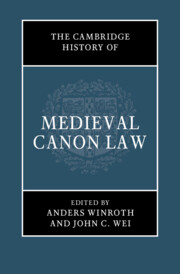Book contents
- The Cambridge History of Medieval Canon Law
- The Cambridge History of Medieval Canon Law
- Copyright page
- Contents
- Figures
- Maps
- Tables
- Contributors
- Acknowledgments
- Abbreviations
- Medieval Canon Law: Introduction
- Part I The History of Medieval Canon Law
- Part II The Sources and Dissemination of Medieval Canon Law
- Part III Doctrine and Society
- Iudicium
- Clerus
- Conubium
- Crimen
- Conclusion
- 30 The Spirit of Canon Law
- Bibliography of Primary Sources
- Index
- References
30 - The Spirit of Canon Law
from Conclusion
Published online by Cambridge University Press: 13 January 2022
- The Cambridge History of Medieval Canon Law
- The Cambridge History of Medieval Canon Law
- Copyright page
- Contents
- Figures
- Maps
- Tables
- Contributors
- Acknowledgments
- Abbreviations
- Medieval Canon Law: Introduction
- Part I The History of Medieval Canon Law
- Part II The Sources and Dissemination of Medieval Canon Law
- Part III Doctrine and Society
- Iudicium
- Clerus
- Conubium
- Crimen
- Conclusion
- 30 The Spirit of Canon Law
- Bibliography of Primary Sources
- Index
- References
Summary
Canon law was formed as the legal order of the Christian Church during its two thousand years of history since the origins of Christianity in the first century after Christ. Because of its character as religious law, it can be subsumed as a type of sacred law together with Islamic and Jewish law. But when comparing canon law with other sacred laws, we should be aware of its peculiarities. The great sociologist Max Weber (1864–1920) saw its difference from other religious laws in its unique rationality, which he defined as “material rationality.” In Weber’s understanding, this category of rationality meant the orientation of legal traditions toward ethical principles, utility, and political maxims. Weber saw in canon law a guide for secular law on its way to rationality in western legal culture. This evaluation by one of the founding fathers of legal sociology should not be forgotten by legal historians. European legal history, indeed western legal history in general, was influenced by the “two laws,” secular law and canon law. Thus some knowledge of canon law and its principles seems a necessary precondition for a full understanding of the legal heritage of our modern world.
- Type
- Chapter
- Information
- The Cambridge History of Medieval Canon Law , pp. 573 - 583Publisher: Cambridge University PressPrint publication year: 2022
References
Select Bibliography
- 2
- Cited by

